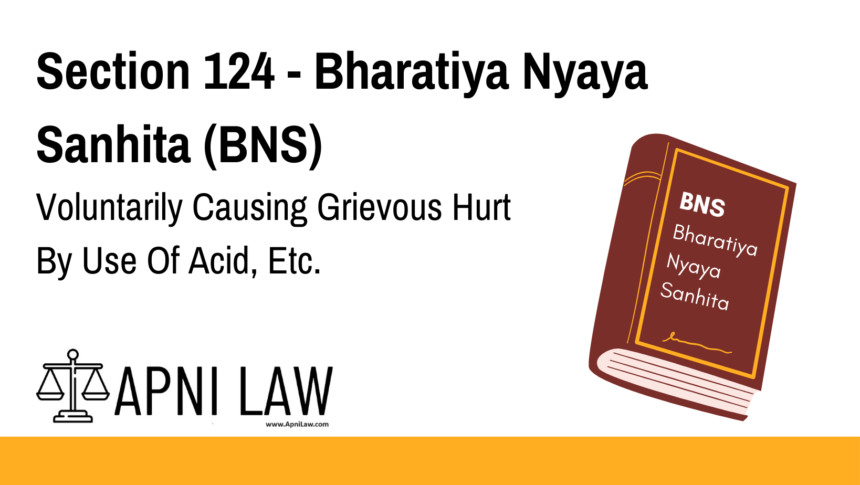Code: Section 124 BNS
Voluntarily Causing Grievous Hurt By Use Of Acid, Etc.
(1) Whoever causes permanent or partial damage or deformity to, or burns or
maims or disfigures or disables, any part or parts of the body of a person or causes grievous
hurt by throwing acid on or by administering acid to that person, or by using any other
means with the intention of causing or with the knowledge that he is likely to cause such
injury or hurt or causes a person to be in a permanent vegetative state shall be punished with
imprisonment of either description for a term which shall not be less than ten years but which
may extend to imprisonment for life, and with fine:
Provided that such fine shall be just and reasonable to meet the medical expenses of
the treatment of the victim:
Provided further that any fine imposed under this sub-section shall be paid to the
victim.
(2) Whoever throws or attempts to throw acid on any person or attempts to administer
acid to any person, or attempts to use any other means, with the intention of causing
permanent or partial damage or deformity or burns or maiming or disfigurement or disability
or grievous hurt to that person, shall be punished with imprisonment of either description for
a term which shall not be less than five years but which may extend to seven years, and shall
also be liable to fine.
Explanation 1.—For the purposes of this section, “acid” includes any substance
which has acidic or corrosive character or burning nature, that is capable of causing bodily
injury leading to scars or disfigurement or temporary or permanent disability.
Explanation 2.—For the purposes of this section, permanent or partial damage or
deformity or permanent vegetative state shall not be required to be irreversible.
Explanation of Section 124 BNS
Section 124 of the Bharatiya Nyaya Sanhita (BNS) criminalizes acid attacks and grievous hurt caused by corrosive substances. The provision ensures severe punishments for offenders while also mandating compensation for victims.
Key Provisions:
-
Definition of Offense:
- Throwing, administering, or using acid or corrosive substances to cause grievous hurt.
- Intentional or knowing actions leading to burns, maiming, disfigurement, or disability.
-
Punishments:
- For causing grievous hurt: Minimum 10 years of imprisonment, extendable to life imprisonment, along with a fine for medical expenses.
- For attempting the crime: Minimum 5 years of imprisonment, extendable to 7 years, along with a fine.
-
Definition of Acid:
- Any substance with acidic or corrosive properties that can cause burns, scars, or permanent disability.
-
Victim Compensation:
- The fine collected from the accused is paid directly to the victim to support medical treatment.
-
Irreversibility Not Required:
- The law clarifies that even temporary damage or deformity falls under this section, ensuring broader protection for victims.
Illustrations
Example 1: Acid Attack Causing Permanent Damage
A man throws acid on a woman after a personal dispute, causing permanent facial scars and loss of vision in one eye. Under Section 124(1) BNS, he is sentenced to life imprisonment and fined to cover her medical expenses.
Example 2: Attempted Acid Attack
A person tries to throw acid on a shopkeeper over a business rivalry but is caught before execution. Under Section 124(2) BNS, he receives 5 years of imprisonment along with a fine.
Example 3: Use of Corrosive Chemicals
A factory worker deliberately pours an industrial corrosive substance on a colleague, leading to severe burns. The Court treats it as an acid attack, sentencing the accused under Section 124 BNS.
Common Questions and Answers on Section 124 BNS
1. What is considered “acid” under this law?
Any substance with acidic, corrosive, or burning properties that can cause bodily harm, scars, or disabilities falls under this definition.
2. Is it necessary for the injury to be permanent for prosecution?
No. As per Explanation 2, even temporary injuries are punishable under Section 124.
3. What if a person only attempts to throw acid but does not succeed?
An attempt to throw acid is still a crime under Section 124(2) BNS, punishable with 5 to 7 years of imprisonment and a fine.
4. Does the law provide for victim compensation?
Yes, the fine collected from the accused must be paid to the victim for medical treatment.
5. Can an acid attack case be settled through compromise?
No. Acid attacks are a serious offense, and the case cannot be withdrawn or settled privately.
Conclusion
Section 124 BNS is a strict law against acid attacks, ensuring severe punishment for offenders while providing financial support for victims. The law’s broad definition of “acid” and irreversibility not being a condition ensures strong legal protection against this heinous crime.
For more legal insights, visit ApniLaw today! 🚀








